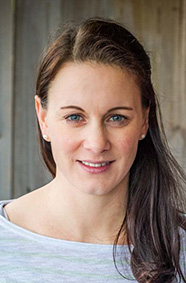 Honorary Lecturer – Movement Neuroscience
Honorary Lecturer – Movement NeuroscienceBSc(Auck) PGDipP MPhEd PhD(Otago)
Email rebekah.blakemore@otago.ac.nz
Background
Rebekah Blakemore joined the School in 2019. Rebekah obtained her BSc (Sport and Exercise Science, 2003) at the University of Auckland before moving to Dunedin to complete her MPhEd (2006, Distinction) and PhD (2011) in Movement Neuroscience using EEG and EMG at the School of Physical Education, Sport and Exercise Science. Rebekah then completed a 3 year Postdoctoral Fellowship at the University of Geneva, Switzerland, where she combined Movement and Affective Neuroscience to investigate emotion-motor interactions using fMRI. This worked was funded by a Marie Curie COFUND Fellowship, and European Union FP7. Rebekah returned to New Zealand via the Neurological Foundation Repatriation Fellowship, where she worked as a Research Fellow in the Department of Medicine, University of Otago, Christchurch and the New Zealand Brain Research Institute (2015-2019), funded by the Neurological Foundation of New Zealand.
Research
Rebekah has three interrelated research themes that examine motor function in healthy and movement disorder populations:
- Neural mechanisms underlying the preparation, initiation, and control of voluntary movement, primarily upper limb motor control
- Interactions between the emotion and motor systems, especially stress-induced modulation of motor behaviour
- Conceptions of action as being voluntary/intentional or involuntary/unintentional, and modulation of the motor system outside of conscious awareness
Rebekah's research is interdisciplinary drawing on frameworks from movement and affective neuroscience, cognitive neuroscience, and neurology. Rebekah uses a multi-methodological approach, and has expertise in event-related potentials (EEG), electromyography (EMG), functional magnetic resonance imaging (fMRI), movement kinematics, and psychophysiology. She has a specialist clinical interest in functional neurological symptom disorder (conversion disorder) and Parkinson's disease.
Postgraduate students
Potential postgraduate students must have an interest in how the brain controls movement. Please consult the University of Otago scholarships webpage to check eligibility for international and domestic student scholarships.
Visit the University of Otago scholarships webpage
Publications
Blakemore, R. L., MacAskill, M. R., Myall, D. J., & Anderson, T. J. (2019). Volitional suppression of parkinsonian resting tremor. Movement Disorders Clinical Practice, 6(6), 470-478. doi: 10.1002/mdc3.12801 Journal - Research Article
Blakemore, R. L., MacAskill, M. R., Shoorangiz, R., & Anderson, T. J. (2018). Stress-evoking emotional stimuli exaggerate deficits in motor function in Parkinson's disease. Neuropsychologia, 112, 66-76. doi: 10.1016/j.neuropsychologia.2018.03.006 Journal - Research Article
Blakemore, R. L., & Vuilleumier, P. (2017). An emotional call to action: Integrating affective neuroscience in models of motor control. Emotion Review, 9(4), 299-309. doi: 10.1177/1754073916670020 Journal - Research Article
Blakemore, R. L., Neveu, R., & Vuilleumier, P. (2017). How emotion context modulates unconscious goal activation during motor force exertion. NeuroImage, 146, 904-917. doi: 10.1016/j.neuroimage.2016.11.002 Journal - Research Article
Blakemore, R. L., Sinanaj, I., Galli, S., Aybek, S., & Vuilleumier, P. (2016). Aversive stimuli exacerbate defensive motor behaviour in motor conversion disorder. Neuropsychologia, 93(Part A), 229-241. doi: 10.1016/j.neuropsychologia.2016.11.005 Journal - Research Article
